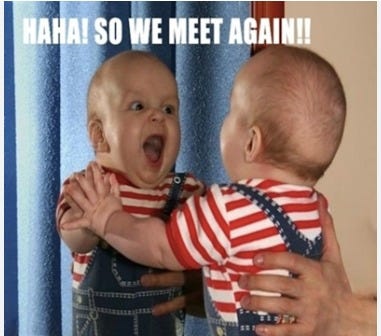How did you find reading about a healthy sense of self and attachment last week? If you are interested in working out what your attachment style may be then I can recommend this book.
When you think of trust in a healthy relationship, where does your head go? Maybe it goes to, ‘How can I trust someone else?’, or possibly, ‘What do I need to do to gain other people’s trust?’ What about…how do I trust myself?
The mirror
How can I trust you?
You shook me to the core.
You ignored my cries for help,
You laughed when I felt sore.
How can I trust you?
You don’t look me in the eye!
You cover up what you really feel,
Each time you speak: you lie!
How can I trust you?
I told you my deepest fears,
But you dressed them up in fantasy.
You ignored my bewildered tears.
Yet as I stand before you,
Our mouths synchronised in time
Your betrayals are so familiar,
For the face I see… is mine.
I can’t tell you how many times I sit with someone in therapy as they share their self-doubt, their ‘I shouldn’t feel this way’, or ‘Maybe I’m being too…’
Did you know that a major part of your stress can be down to the inner conflict that you have between your intuition and your ‘shoulds’?
What if the first relationship that you need to learn to trust is the relationship with yourself?
Brené Brown has a brilliant breakdown of the anatomy of trust in her book 'Braving the Wilderness' which I always share with my clients. She breaks it down into 7 separate specific behaviours which can be remembered by using the acronym ‘BRAVING’: boundaries, reliability, accountability, vault (confidentiality), integrity, non judgment and generosity. You can hear more from the woman herself here.
But as I said last week, we all come at life from an unlevel playing field of attachment and this can affect the way we trust. People with non-secure attachments may be hyper-vigilant - perceiving the mindlessness of another as personal sleight, or avoidant: in fear of being emotionally engulfed by another.
Flipping heck, what a minefield.
Whether another person is deserving of our trust or not is kind of irrelevant if we don’t trust our own judgment. Maybe you really don’t believe that you can or should trust your own judgment, maybe it has lead you to make mistakes in the past. That doesn’t mean that you delegate it to someone else! It means you work on learning what experiences you have had which have lead to you learning to not trust yourself.
Maybe you had experiences of:
A) Being gaslit - be told that your reality is not the reality.
B) Not being able to voice your vulnerability.
C) Being betrayed, so that you question your own story and values.
D) Feeling toxic shame, because those who are behaving badly are shameless.
As we then go on through life, we find the familiar. Even when we aren’t looking for it, even when we positively look for the opposite, we run into it head first.
Why is this?
It’s trauma repetition. It also goes by the name of repetition compulsion. Trauma repetition happens as the victim unconsciously tries to find a way to resolve the traumatic memory. They try, over and over again, to work out a way to respond to the original trauma in order to eradicate fear. However, what happens instead is a deepening of the wound. It’s like trying to eradicate the appearance of a scar by cutting yourself open again and seeing if you can make that cut heal better. And cutting again, and again, and again.
That cutting can be as subtle as a papercut - and we all know how painful those are. It may not look significant, but compulsive caregiving, denial, self-victimisation are all ways in which we can cut ourselves again. They are all ways in which we try to patch up the wound of emotional abandonment with what we have learnt as culturally approved ways to deny our pain.
What can you do about it?
Self awareness is the first step. Becoming aware of how you feel when you may be not trusting your gut or betraying your inner needs and wants.
Extract yourself from being in a victimised role.
Learn healthier ways to communicate your needs than manipulation, triangulation and people pleasing.
No fear my little delightfuls, I’ll be addressing these last two points in the weeks to come.
Let me know what resonated with you from reading this. How well can you trust your intuition or do you have an automatic override? Undoing this work takes time and effort, but it is possible and it is worth it!
Would you be interested in working on this within a curated group of like-minded people? I’m formulating a plan to this, so let me know if you are want to hear more!
That’s it for now,
‘Til next time.
Jacky x.
Ps. You may have noticed that I have not sent out a poetic update this month. All the balls, all the things, I just haven’t had the time, so I decided to gift this missive to all subscribers rather than those you have a paid subscription for this month. If you like it, you can upgrade your subscription here. Thank you for reading!






I’d like to join this group if you get it set up please Jacky - what you say really resonates with me. Angela